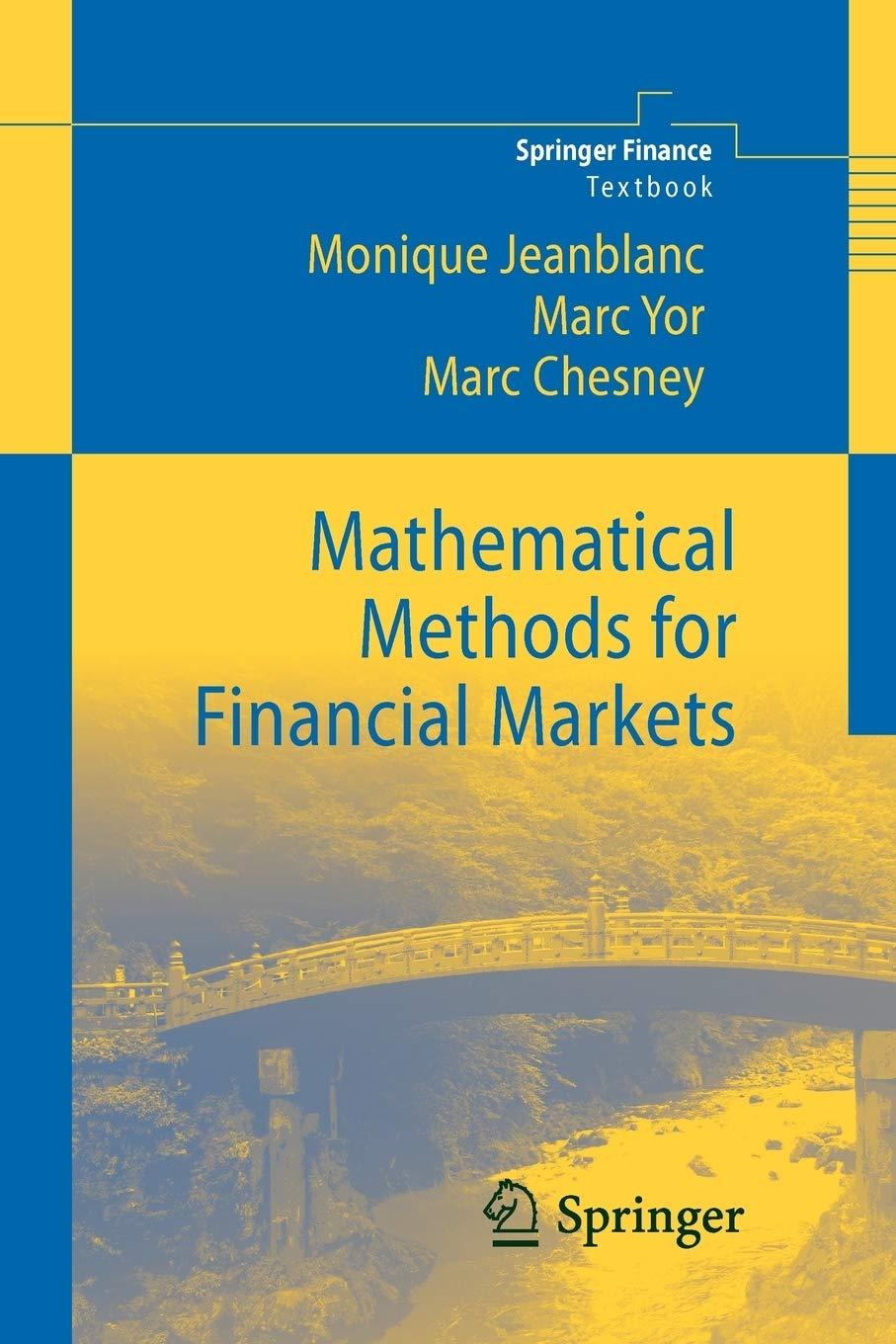We shall now extend the result of Proposition 6.2.5.3 by computing the Laplace transform [mathbb{Q}_{x}^{delta}left[exp left(-lambda int_{0}^{t}
Question:
We shall now extend the result of Proposition 6.2.5.3 by computing the Laplace transform
\[\mathbb{Q}_{x}^{\delta}\left[\exp \left(-\lambda \int_{0}^{t} d u \phi(u) ho_{u}\right)\right]\]
In fact, let \(\mu\) be a positive, diffuse Radon measure on \(\mathbb{R}^{+}\). The Sturm-Liouville equation \(\Phi^{\prime \prime}=\mu \Phi\) has a unique solution \(\Phi_{\mu}\), which is positive, decreasing on \(\left[0, \infty\left[\right.\right.\) and such that \(\Phi_{\mu}(0)=1\). Let \(\Psi_{\mu}(t)=\Phi_{\mu}(t) \int_{0}^{t} \frac{d s}{\Phi_{\mu}^{2}(s)}\).
1. Prove that the function \(\Psi_{\mu}\) is a solution of the Sturm-Liouville equation, such that \(\Psi_{\mu}(0)=0, \Psi_{\mu}^{\prime}(0)=1\), and the pair \(\left(\Phi_{\mu}, \Psi_{\mu}\right)\) satisfies the Wronskian relation
\[W\left(\Phi_{\mu}, \Psi_{\mu}\right)=\Phi_{\mu} \Psi_{\mu}^{\prime}-\Phi_{\mu}^{\prime} \Psi_{\mu}=1\]
2. Prove that, for every \(t \geq 0\) :
\[\begin{gathered}\mathbb{Q}_{x}^{\delta}\left(\exp \left(-\frac{1}{2}\left(\int_{0}^{t} ho_{s} d \mu(s)+\lambda ho_{t}\right)\right)\right) \\=\frac{1}{\left(\Psi_{\mu}^{\prime}(t)+\lambda \Psi_{\mu}(t)\right)^{\delta / 2}} \exp \left(\frac{x}{2}\left(\Phi_{\mu}^{\prime}(0)-\frac{\Phi_{\mu}^{\prime}(t)+\lambda \Phi_{\mu}(t)}{\Psi_{\mu}^{\prime}(t)+\lambda \Psi_{\mu}(t)}\right)\right),\end{gathered}\]
and
\[\mathbb{Q}_{x}^{\delta}\left(\exp \left(-\frac{1}{2} \int_{0}^{\infty} ho_{s} d \mu(s)\right)\right)=\left(\Phi_{\mu}(\infty)\right)^{\delta / 2} \exp \left(\frac{x}{2} \Phi_{\mu}^{\prime}(0)\right) .\]
3. Compute the solution of the Sturm Liouville equation for
\[\mu(d s)=\frac{\lambda}{(a+s)^{2}} d s, \quad(\lambda, a>0)\]
(one can find a solution of the form \((a+s)^{\alpha}\) where \(\alpha\) is to be determined).
Proposition 6.2.5.3:
For a \(\mathrm{BESQ}^{\delta}\), we have for every \(\lambda>0, b eq 0\)
\[\begin{align*}
& \mathbb{Q}_{x}^{\delta}\left[\exp \left(-\lambda ho_{t}-\frac{b^{2}}{2} \int_{0}^{t} ho_{s} d s\right)\right] \tag{6.2.14}\\
& =\left(\cosh (b t)+2 \lambda b^{-1} \sinh (b t)\right)^{-\delta / 2} \exp \left(-\frac{1}{2} x b \frac{1+2 \lambda b^{-1} \operatorname{coth}(b t)}{\operatorname{coth}(b t)+2 \lambda b^{-1}}\right) .
\end{align*}\]
Step by Step Answer:

Mathematical Methods For Financial Markets
ISBN: 9781447125242
1st Edition
Authors: Monique Jeanblanc, Marc Yor, Marc Chesney





